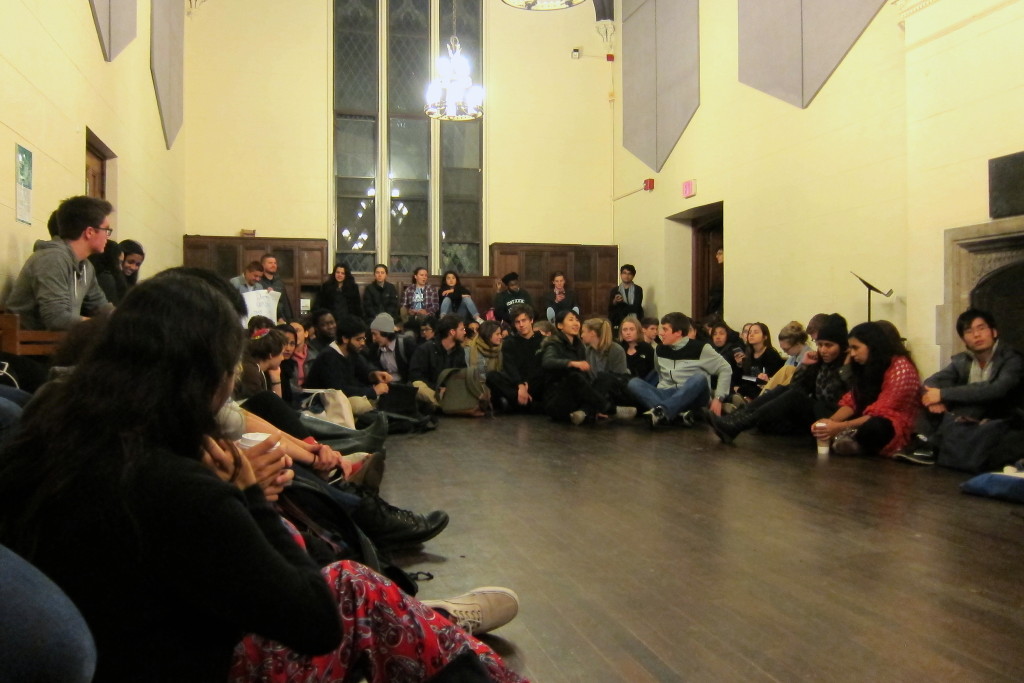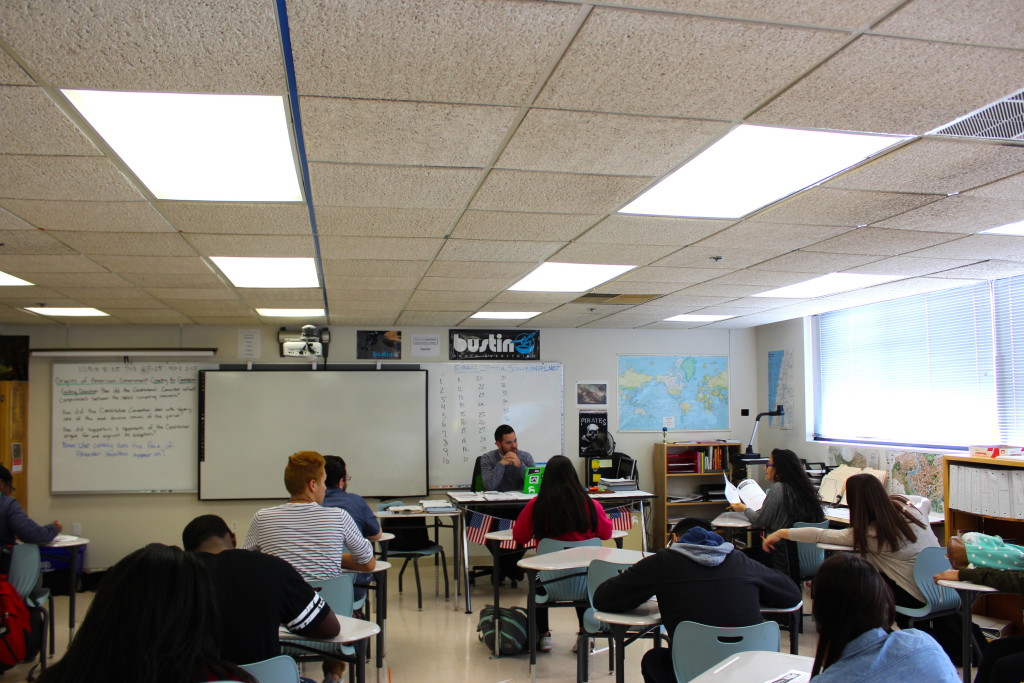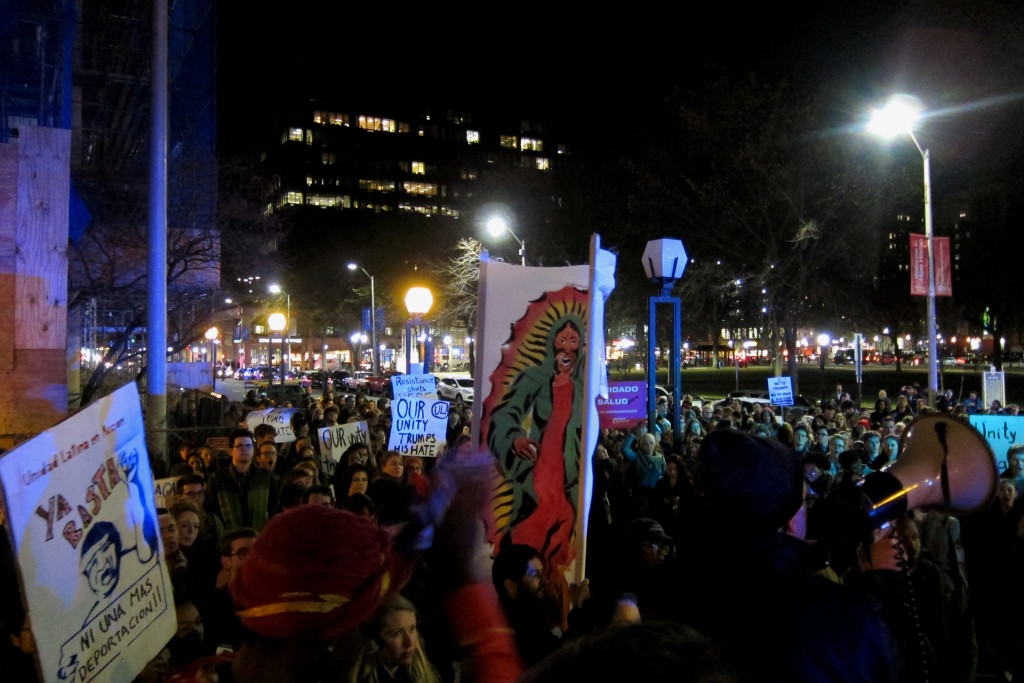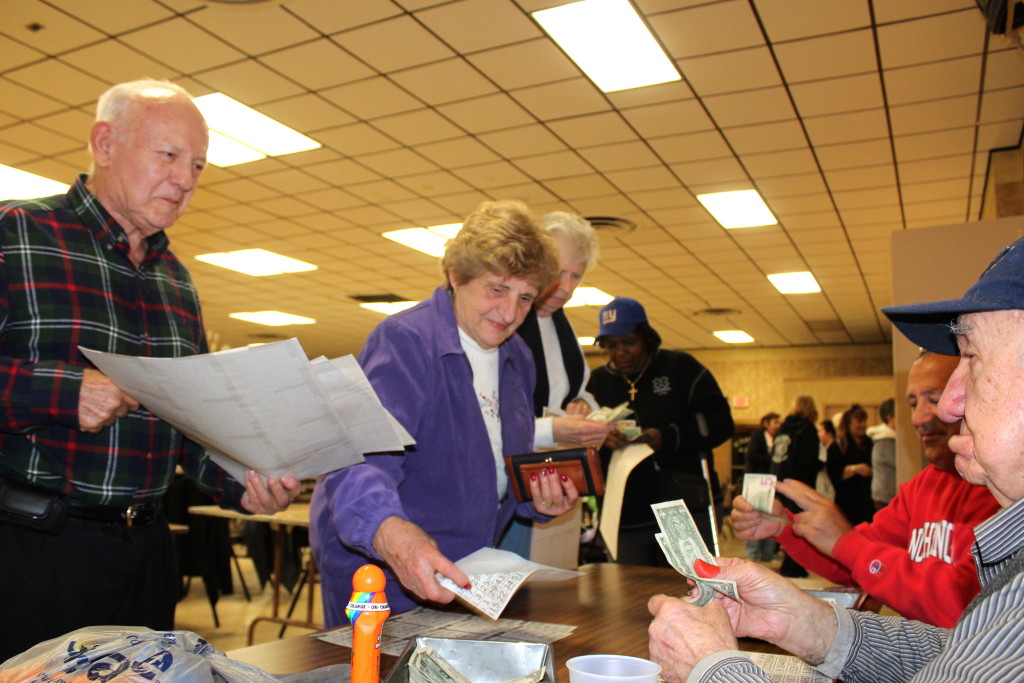On Election Day, New Haven was on the wrong side of a historic upset. Over thirty-four thousand Elm City voters cast ballots for Hillary Clinton; just under five thousand chose president-elect Donald J. Trump. After the race was over—settled in far-away places like southwest Virginia and Kenosha County, Wisconsin—the result dominated conversations all over the city, sparking endless debates about its significance and what to expect from a Trump presidency. The following vignettes are not meant to offer a comprehensive portrait of New Haven residents’ reactions. Rather, they offer glimpses into the ways people respond to national division, whether in a school, on the street, or in a church. This is how uncertainty in America felt in the wake of November 8, 2016.
“What Now? What Next?”
Dwight Chapel, Yale University
Wednesday night
The Facebook event was called “What Now? What Next?” But by the time some two hundred Yale students trickled into Dwight Hall’s common room on Wednesday night—about twenty-four hours after it became clear that the vast majority of campus had cast their vote for the losing candidate—the mood was less forward-looking than funereal. If you believed the punditry, we were “the establishment” Trump’s voters had punished. What now? What next?
Conversations began with hugs, and they mostly went the same way.
“How have you been holding up?”
“Not great.”
People sat in a circle on the hardwood floor, and organizers (a new group called the “Yale Student Group Leaders”) thanked everyone for coming. They opened the floor. A leader with Unidad Latina en Acción invited everyone to the protest Thursday evening. A representative of the Office of International Students & Scholars assured the crowd that Yale would do everything in its power to protect the twenty percent of its students who are not American citizens. A freshman read a poem. He said of America, “What we thought it was isn’t actually what it is.” A boy in the corner carried a sign that said “White Supremacy: I’m Coming for That Ass.”
The poster’s tone stood out at an event that concluded with a group rendition of “This Little Light of Mine.” Organizers insisted that everyone could stay and talk and plan for the future, but when the song was over most people stood up, passed around a few more hugs, put on their backpacks, and walked out, back to the library or to a meeting that hadn’t been canceled, back to normal life in a place we knew now—more than ever before—was a different part of America.
– Isabelle Taft

Civics class
High School in the Community
Thursday morning
The students in Justin Scully’s third-period civics class at High School in the Community, a New Haven public school on Union Street, laugh more on November 10 than they did on November 9. The day after Donald Trump’s election, both Carolyn Martinez and Vartaysha Reed cried during class. Today, though, the juniors have a test on the foundations of the US government—the Virginia Plan, the Articles of Confederation, a bonus question of who’s on the ten dollar bill—and the tears are gone. Morning light floods through the windows onto the linoleum floor. Before Scully passes out the test, I ask the class a few questions about how they’re feeling.
Tyron Huston sits in the center row of the desks and remembers the previous day. “Justin was really depressed,” he says, smirking. Scully nods. Martinez jumps in to say that she is terrified, and others assent. The students—none of whom are old enough to vote—used to joke about Trump’s campaign, but the humor is different now. It’s more exhausted; a placeholder for resignation.
Scully cuts through the chatter to point out Laurel Cubellotti, the class’s only Trump supporter. She reluctantly reports that she’s happy with the results, tacking on a bashful “sorry” and a shrug. She doesn’t seem victorious. “I’m actually really shocked,” she says. “When he won, I didn’t know what to do.” Scully adds that Trump’s New York hotel, which he has visited, is, in fact, nice. (Reed retorts that her grandmother has been there, too, “and she says it’s trash.”)
The students move on, discussing a recount, whether Bernie Sanders might have defeated Trump, and the rumor that fourteen thousand Americans voted for the slain gorilla Harambe. When Scully passes out the tests, things quiet down. Now, they have to remember how many states had to ratify the Bill of Rights. When backpacks start zipping closed an hour later, Scully reminds them about their upcoming essay on John Locke. The bell rings.
– Elena Saavedra Buckley

“United Against Hatred”
New Haven Green
Thursday night
Three hundred protesters surged out of the plaza in front of the Connecticut Financial Center and onto Church Street on the Thursday evening after the election. Unidad Latina en Acción, a New Haven-based immigrant rights advocacy group, had planned the demonstration at a meeting the night before. Organizer Dan Ravizza brought a bass drum, emblazoned with a Jolly Roger, from the Local No. 24 Carpenters Union. He fired up the crowd with a pulsating beat.
University of Connecticut student and ULA member Jesus Morales-Sanchez spoke first. “Trump has given his implicit permission to hate,” he said. “Now we know for sure the fight must continue.” Susan Bramhall, a member of Jewish Voice for Peace who has participated in protests in New Haven since 1969, said the protest was the largest she’d seen since the Iraq War.
At the behest of John Lugo, the co-founder of ULA, the crowd chanted a call-and-response: “Whose streets?” “Our streets!” The protestors marched around the Green. As the crowd circled Rite Aid, it fell into rhyme: “Hey hey! Ho ho! Donald Trump has got to go!” Shop owners peered out of their storefronts as they passed by – young and old, organizers and attendees, students and residents – wielding banners, linking arms, bringing the city center to a halt.
Herman Zuniga, president of Community Immigrants of East Haven, shouted into the night, his voice breaking. “I came to this country twenty-nine years ago. I am one hundred percent immigrant. I fought for my papers for seventeen years,” he told the crowd. “Who are you, Donald Trump, to tell us to choose between religion, color, gender, or political party? Who are you, Mr. Trump?”
– Mark Rosenberg

Board of Alders meeting
City Hall
Thursday night
New Haven’s alders filed into their chambers in City Hall for their first full meeting since Donald J. Trump became America’s president-elect. On Thursday evening, the mood was subdued; every New Haven alder belongs to the Democratic Party. Alder President Tyisha Walker of Ward 23 called the meeting to order, and the alders rose for the customary prayer for “Divine Guidance.”
Ward 10 Alder Anna Festa walked solemnly to the podium. “In light of everything that’s been going on in our country with immigration, I thought it would be nice to read a biographical narrative my daughter wrote about her grandmother,” she said.
Festa told the story of her mother, Linda, who immigrated from Amarosi, Italy to New Haven in the early nineteen-sixties. Linda embraced her new city, Festa said, finding work in a dress shop and support from the local Italian community. She soon married and began raising a family in her home on Orange Street.
The alders applauded as Festa returned to her seat. With muted efficiency, they moved through the items on the agenda and personal announcements—an upcoming Thanksgiving turkey drive, birthday wishes for an absent alder—and the meeting adjourned after only half an hour.
Standing in the threshold of the chambers, Ward 25 Alder Adam Marchand said that the election results were more than disappointing, especially given the strong voter turnout in his district. He emphasized that despite Trump’s threat to revoke federal funding for all sanctuary cities, New Haven would maintain its identity as a place of acceptance and refuge.
The disorientation generated by the election seemed to linger in the chambers as the alders drifted out. Tidying up afterwards, a staff member handed a copy of Trump’s plan for his first one hundred days in office to a security guard, who shook his head in disbelief.
– Eliza Fawcett
The Annex Club
East Shore
Thursday night
The Annex Club sits just off I-95 on the way to East Haven. Founded in 1938 as a center for Italian-American men, the Club is now run by the sons and grandsons of its first generation. Joe Tirotello, who is eighty-eight, is one of those men. At 6:30 p.m. on November 10, he sits inside, having just bought a ticket for Bingo Night, a main source of the Annex Club’s income. He immediately asks me if I voted.
“I seen a lot of them,” Tirotello says of elections. “This is the worst one. Now that he’s our president, even if I don’t like him, I got to back him up. I did the same thing with Kennedy.” What makes Joe most unhappy, though, is the anti-Trump rallying occurring in downtown New Haven and across the country.
“I don’t really know what the hell they’re mad at,” he tells me. “I don’t believe in violence, anyways. Just makes us look like a bunch of idiots.”
Ed and Shirley, who, like most of the others I meet, have been coming to the Club for “too long,” sit in the back with their friend Gail. Shirley tells me that her mother wouldn’t allow her to accept a college scholarship “because girls don’t go to college.” When I ask her how she felt about Hillary, she tisks. “She’s just a liar. I think he’ll be fabulous.”
Gail, who volunteered for Trump, eagerly chimes in:
“They’ll shoot you through your window if you have a Trump sign. It’s politics.”
Tirotello is one of the only non Trump-supporters that I meet at the Annex Club, and the only one to bring up the election without my asking, but he still joins in when the bingo starts. The first-place prize last week was five hundred dollars; tonight’s players are feeling lucky.
– Juliette Neil

Planned Parenthood
East Rock
Saturday morning
Outside the Planned Parenthood at the intersection of Whitney Avenue and Edwards Street, the first Saturday after Trump’s election is like most Saturday mornings: The clinic is performing abortions, and people outside are holding brightly colored signs, engaged in protest and counter-protest.
Across the street from the clinic, a pro-choice man named Chris with a cigarette tucked behind one ear uses his sign to obscure that of a pro-life activist named Barrie. Hers has a picture of two ultrasounds with the caption: “Which of these two human beings was conceived in rape?” When Barrie moves, Chris follows her. She raises her sign. He raises his.
Barrie finally says, soothingly, “I’m praying for you, Chris.” He angrily wheels around to face her, their body-length signs pressed together. Barrie takes off her sunglasses. “Back up, Chris.” He doesn’t. They stand in gridlock.
Later, after moving to another side of the street, Chris tells me the pro-life protestors are emboldened by Trump. “Their guy might have won the White House, but we will win the struggle,” he says. Eyeing Chris across the street, Barrie says direct confrontations like this are rare. “This type of behavior is, of course, because of the election,” she says.
Chris foresees this type of conflict escalating in Trump’s America. He cites Obama’s plans to permanently protect Planned Parenthood’s funding and says: “Because Trump can’t do anything with the funding, they’ll harass patients and people like us.” He crosses his arms, feet firmly planted on the sidewalk.
And Barrie? “I’ll be here every Saturday until I die,” she says, “or I move.” What if Trump appoints a Justice to overturn Roe v. Wade? “Not going to happen,” she sighs. “No chance.”
At 10:30 a.m., the protest is over, and the sign-holders get in cars — some plastered with Clinton stickers, some with Trump. They’ll be back next Saturday. And the one after that. And the one after that.
– Amelia Nierenberg
Partners Cafe
Downtown
Saturday night
DJ Gabby plays Top 40 and Latin hits at Partners Cafe on Saturdays like this, but tonight, after the presidential election, the dance floor is deserted. Beyoncé plays in the bar downstairs. I’m sitting next to a couple of hockey players in Yale jerseys who are finishing their beers, wondering if the Rangers are still up. Across the bar, two locals boasting chest tattoos and green lipstick debrief the election in halfhearted murmurs.
“How do I feel?” asks Orbel, one of the other people at the bar who is sipping a pink cocktail and talking to his friend in Spanish. He hesitates for a few moments, as if to gird himself for the answer. “I’m not afraid.”
Orbel—whose name is an amalgamation of Isabel and Orlando—moved from his native Puerto Rico after earning his business degree there in 2012, and he’s been working at a consulting firm in the Northeast ever since. “The laws were passed—they can’t just change them.” He worries about new appointments to the Supreme Court, though, not to mention how people might treat him outside places like this. “I guess I’m fifty percent afraid.”
For Liesegang, a Trump White House is no great surprise. “Is it shocking?” she laughed. “No. It’s the last gasp of the great white group.” When Liesegang transitioned in the nineties, there were even fewer legal protections for trans people, which inspired her to found the Connecticut TransAdvocacy Coalition almost twenty years ago. She’s not convinced that queer youth, especially queer people of color, are much safer now. She points out that you can still get fired in most states for being gay or trans.
As for the next four years, her plans haven’t much changed. “All I can say is I’m going to keep trying to fuck the system.” I ask her if she sees a storm gathering. She shakes her head. It’s been raging for a while, she says, and storms like these never really pass.
– Spencer Bokat-Lindell
Dixwell Avenue Congregational United Church of Christ
Dixwell
Sunday morning
Until Reverend Porsha Williams’ sermon, the service at the Dixwell Avenue Congregational United Church of Christ had been mostly business as usual. Couples smiled and greeted each other as they found their seats, the teen choir sang in rainbow stoles, and the speakers did what they had long planned to do that morning: honor their congregation’s graduates of the historically black Bennett and Morehouse Colleges and pay tribute to their late pastor, Reverend Dr. Edwin R. Edmonds. Even the earlier mentions of Trump’s election hadn’t relayed any shock or despair. “We’ve been here before,” said Toni Walker, a Connecticut state representative and the daughter of Reverend Edmonds. “With President Reagan, and in the early nineteen-hundreds. This is just a setback.”
Williams, a guest preacher, wasn’t just there to talk about progress and setbacks. “By the rivers of Babylon, we sat down and wept, when we remembered Zion,” she began her sermon, quoting Psalm 137 and comparing the Black community to the Israelites in exile. “The Psalm says, ‘For there our captors asked us for songs, our tormentors demanded songs of joy.’ But we are not here for your entertainment. Our songs mean something to us, and we are not in Zion.”
People in the crowd started to shout in assent. “They are wondering how we’re still a people of faith. How after slavery, you can still smile, how after Jim Crow, you can still dance, how after the war on drugs, you can leap for joy, how after mass incarceration, you can still sing.” Nearly everyone was crying out now, some standing or holding up their hands. Williams kept speaking, louder and louder, without stopping to take a breath. “You say to them that God did that,” she said, “God did that all by himself.”
– Ruby Bilger

